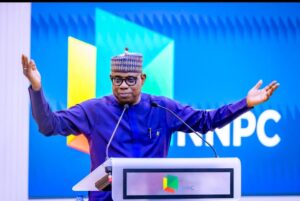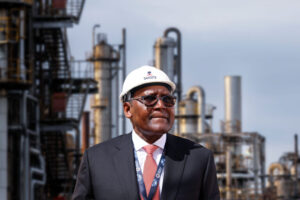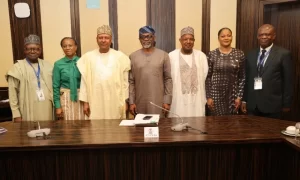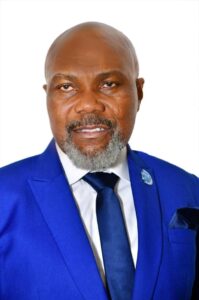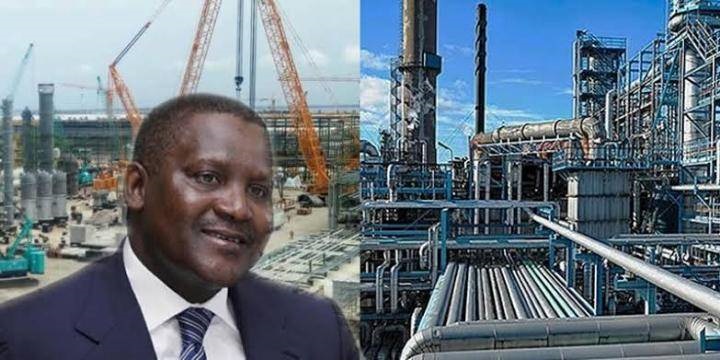
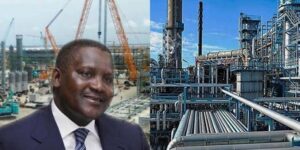
NIGERIA TO EARN $21BN ANNUALLY FROM DANGOTE REFINERY
Nigeria will rake in $21 billion dollars per annum from Dangote Petroleum Refinery,which has been described as a legacy project.
Already,the Nigerian National Petroleum Company Limited, NNPCL, has assured its readiness to deliver 300,000 barrels daily of crude oil to kick off its refining activities
Group Chief Executive Officer, GCEO, of the Company, Mallam Mele Kyari, while speaking at the opening of the fourth edition of the Nigerian Oil and Gas Opportunity Fair (NOGOF) 2023, said the Company’s stake in the refinery is to ensure it delivers value to the country by making products available and enhancing in-country refining capacity.
Besides boosting local refining, Kyari said enormous energy is being exerted to recover local crude oil production to retain Nigeria’s leadership in the continent as the country in March attained about 1.67 million daily production.
He also said efforts are being directed to increasing gas production and also deepening local consumption through various gas commercialization programmes.
GREATRIBUNETVNEWS reports that as the Dangote refinery gets ready for commissioning, it has been estimated that the 650,000 barrels per day plant would yield about 21 billion dollars yearly for Nigeria
According to a fact sheet on Dangote refinery released on Wednesday in Lagos, the plant is the world’s largest single-train 650,000 barrels per day petroleum refinery with 900 KTPA polypropylene plant.
The fact sheet drawn by the company said: “The Dangote refinery plant is a legacy project that will see Nigeria netting 21 billion dollars per annum”.
The refinery built by billionaire industrialist Aliko Dangote, the refinery, is located in Ibeju-Lekki, Lagos, covering a land area of approximately 2,635 hectares (seven times the size of Victoria Island.)
The refinery is billed for commissioning by President Mohammadu Buhari on May 22.
The facts revealed that Dangote refinery can meet 100 per cent of the Nigerian requirement of all refined products.
The products concludes (Gasoline, 53 million litres per day; Diesel, 34 litres per day; Kerosene, 10 million litres per day and Aviation Jet, 2 million litres per day) and also have surplus of each of these products for export.
Besides, the refinery is laced with 435 Mega Watts (MW) power plant, which is said to have the capacity to meet the total power requirement of five states.
The facility has 177 tanks of 4.742 billion litre capacity, while the temporary housing units on the premises can house 33,000 persons.
The plant is designed for 100% Nigerian crude with flexibility to process other crudes. The fact sheet revealed that diesel and gasoline products from the refinery will conform to Euro V specifications.
For easy off-take of products, the plant is constructed with two quays with a load bearing capacity of 25 tonnes/ sq meter to bring Over Dimensional cargoes close to the site directly.
It constructed two more quays in the port with a capacity to handle up to Panamax vessels to export the fertiliser and the petrochemicals and two quays to handle liquid cargoes.
The port will thus have six quays, including a roll-on/Roll-off quay.
The Dangote is one of the few companies in the world executing a Petroleum Refinery and a Petrochemical complex directly as an Engineering, Procurement, and Construction (EPC) Contract
Globally, apart from three companies, no individual owner has done the complete EPC Contract for a Petroleum Refinery.
The company is training 900 young engineers in refinery operations outside the country, while another six mechanical engineers were trained in the GE University in Italy.
Also, 50 process engineers have been trained by Honeywell/UOP for six months and 50 management trainees.
Meanwhile, the NOGOF 2023 will explore emerging opportunities in the oil and gas industry, linkage sectors as well as the entire African continent, the Executive Secretary of the Nigerian Content Development and Monitoring Board (NCDMB), Engr. Simbi Kesiye Wabote said on Thursday.
He explained that NOGOF was conceptualized in 2016 as part of the Board’s strategies to develop the oil and gas industry and provide a platform to showcase the various opportunities available in the oil and gas industry and foster necessary partnerships in the sector.
He expressed regrets that Nigerian oil and gas service companies missed out on several opportunities in the sector prior to the introduction of NOGOF because no fora existed to showcase forthcoming projects and give them ample to prepare themselves and acquire requisite capacities.
He hinted that previous editions of NOGOF have made a tremendous impact on the Nigerian oil and gas industry, pointing to the ongoing Nigeria LNG Train 7 project as one of the visible benefits. He explained that 50 per cent of the entire US$5bn project scope is currently being executed in-country through Nigerian vendors and that was achieved because key officials of the Nigeria LNG showcased the opportunities inherent in the project at the 2019 edition of NOGOF, thus enabling indigenous companies to prepare themselves adequately.
He hinted that the local content accomplishment on the Train 7 project is a major departure from the insignificant levels that were recorded while constructing Train 1-6. He affirmed that Nigeria could target 70 per cent of the entire project scope when the next train of the LNG would be executed.
On the expansion of 2023 NOGOF to linkage sectors and countries, the Executive Secretary explained that the oil and gas industry has the potential to catalyze industrialization and promote economic growth across sectors, not just in Nigeria, but across the continent. “We hope to stimulate investment, foster technology transfer, and enhance local content development across the African oil and gas value chain,” he added.
He emphasized the need to explore the opportunities that lie in other African countries, especially after we had built huge capacities in-country and they are not being matched by local opportunities and projects.
He said: “In that case, you need to expand your market outside. We tell our sister African countries that there is no need to go to America, Europe, and Asia for oil and gas capacities that exist in the continent. An example is the FPSO integration facility in Lagos.
They should come to Nigeria and other sister African countries so we can share the benefits, reduce our costs, and grow together, especially with the spirit of the African Continental Free Trade Area (AfCTA).
The Executive Secretary further stated that the ideas for hosting NOGOF 2023 are “aligned with the key objectives of the Nigerian Oil and Gas Industry Content Development Act 2010 (NOGICD) Act, which mandates the NCDMB to support the development of local capacities and capabilities in the Nigerian oil and gas industry, foster institutional collaboration, maximize participation of Nigerians in oil and gas activities, link the oil and gas sector to other sectors of the economy, maximize utilization of Nigerian resources, among other objectives.”
He also dwelt on the theme of this year’s edition, which is “The Oil and Gas Industry – Catalyst and Fuel for the Industrialization of Nigeria,” describing it as important as it highlights the critical role of the oil and gas industry in fueling industrialization and overall development of Nigeria’s economy.
He added that the event will provide an opportunity for investors, operators, government officials, and major players across various sectors to engage in quality discussions as the board has secured some sponsors and exhibitors.

